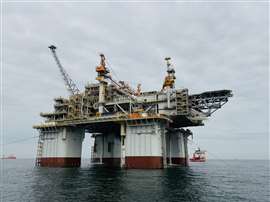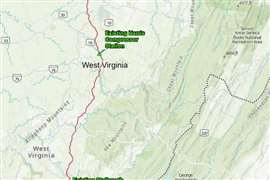Woodside, JERA sign LNG agreement
June 23, 2025
Deal aims to support Japan’s peak demand and energy security starting 2027
 Woodside Energy’s Scarbourough Energy Project. has signed a nonbinding heads of agreement (HOA) with JERA Co., Inc. to supply liquefied natural gas cargoes to Japan during its high-demand winter season. (Image: Woodside Energy)
Woodside Energy’s Scarbourough Energy Project. has signed a nonbinding heads of agreement (HOA) with JERA Co., Inc. to supply liquefied natural gas cargoes to Japan during its high-demand winter season. (Image: Woodside Energy)
Woodside Energy Trading Singapore Pte Ltd has signed a nonbinding heads of agreement (HOA) with JERA Co., Inc. to supply liquefied natural gas cargoes to Japan during its high-demand winter season. The agreement underscores both companies’ commitment to long-term energy cooperation and highlights Japan’s continued focus on energy security amid global supply uncertainties.
The deal calls for Woodside to deliver LNG cargoes on a delivered ex-ship (DES) basis during the winter months—December through February—beginning in 2027 and continuing for at least five years, pending final contract execution. The cargoes will help meet Japan’s peak energy demand during the colder months, when electricity and heating needs traditionally surge.
The HOA is part of a broader push by the Japanese government to secure stable energy supplies through direct partnerships between Japanese companies and international LNG producers. It reflects the cooperative framework established by Japan’s Ministry of Economy, Trade and Industry (METI) and the Japan Bank for International Cooperation (JBIC), which encourages company-to-company collaboration on energy resilience.
“This agreement not only strengthens our relationship with JERA but also reinforces the critical role Woodside plays in supporting Japan’s energy security through the reliable supply of LNG,” said Mark Abbotsford, executive vice president of marketing and trading at Woodside. “We look forward to further collaboration with Japanese partners as we progress towards the startup of our new LNG projects, including the Scarborough Energy Project, where first cargo is targeted for the second half of 2026.”
Woodside, Australia’s largest independent LNG producer, is positioning the Scarborough Energy Project as a cornerstone of its future LNG portfolio. The development includes a new offshore gas field and an expansion of the Pluto LNG plant, designed to boost supply capacity to customers in North Asia.
For JERA, Japan’s largest power generation company and one of the world’s biggest LNG importers, the agreement marks another step in securing firm winter-season supply. “It is critically important for JERA to secure LNG for the high-demand winter season,” said Ryosuke Tsugaru, JERA’s chief low carbon fuel officer. “We are grateful for Woodside’s understanding and cooperation to reach this agreement, which will contribute to enhancing Japan’s energy security. We look forward to further developing our relationship with Woodside, our reliable partner.”
JBIC, which has played a financial and strategic role in Japanese LNG procurement, welcomed the agreement. “This important initiative builds upon the framework established between JBIC and Woodside,” said JBIC Deputy Governor Kazuhiko Amakawa. “JBIC remains committed to supporting Japan’s energy security through diverse forms of engagement with the relevant stakeholders.”
The new agreement builds on a series of recent strategic developments between the two companies. In 2024, Woodside sold a 15.1% non-operating stake in the Scarborough Joint Venture to JERA, completed in October. A separate 10% interest was sold to LNG Japan, finalized in March. In addition, Woodside signed a loan agreement with JBIC in support of the Scarborough project’s development.
The HOA comes at a time when Japan’s LNG buyers are seeking greater long-term supply certainty amid increased competition from European and emerging Asian markets. Although Japan remains the world’s second-largest LNG importer behind China, its reliance on spot purchases has raised concerns in recent years about price volatility and supply risk during peak periods.
In total, the Scarborough development is projected to deliver up to 8 million metric tons per year (mtpa) of LNG once fully operational. Woodside is targeting first gas from the Scarborough field in 2026, followed by ramp-up and long-term delivery commitments.
The deal with JERA adds to Woodside’s growing portfolio of contracted offtake partners in Asia. The company has consistently emphasized the importance of Japan, South Korea, and China as key demand centers for its LNG volumes.
While the heads of agreement is nonbinding, it marks a significant milestone in the strengthening of bilateral energy ties between Australia and Japan, and further institutionalizes the growing role of government-backed frameworks—such as JBIC’s energy security initiatives—in shaping international energy trade.
As final terms are negotiated and the commercial agreement moves toward binding status, both Woodside and JERA say they will continue to explore opportunities to deepen strategic alignment, with energy security and reliability remaining top priorities for both sides.
MAGAZINE
NEWSLETTER

CONNECT WITH THE TEAM









